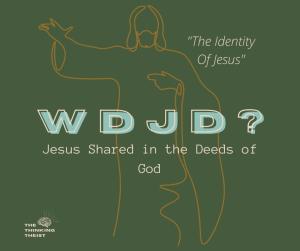
Over the course of this series, we have been exploring the Biblical case for the divinity of Jesus. I believe that this matters because, to put it simply, if Jesus made claims to be God should take them seriously. Even more so, if Jesus’ claims to be God happen to be true, then we owe Him the same honor, and worship that Yahweh is afforded.
The claim that Jesus merely thought of himself as a moral teacher, a revolutionary, or even just a prophet is quite common today. Among some progressive christian , Islamic, and even some Atheist Circles, the idea of Jesus claiming to be nothing more than a mere man is about as common as seeing a tourist in New Orleans wearing Mardi Gras Beads in July (Sorry ya’ll. I had to go there). Yet, a case can in fact be made for Jesus’ self-thought divinity.
The Case So Far
So far we have dove into the HANDS acronym*. We have looked at moments where Jesus accepted honor and praise as if he were God, moments where he shared in the attributes of God, and moments where Jesus has shared in the names of God.
As a quick summary:
- Jesus accepted the praise and honor by his apostles after the account of Him walking on water and after His ascension into heaven.
- He claimed to share in God’s attributes such as existing before Abraham (pointing to His divinity) and in answering the thoughts of the Pharisees
- Jesus shared in Names of God. The Greek word ‘kurios’ took the place of Jehovah and Yahweh (the proper names of God) in the Old Testament when it was translated around the 4th century B.C.E. The Greek New Testament uses the same word in reference to Jesus. Jesus also was not afraid of associating himself with the name Yahweh, itself.
Together, all of these moments form a cumulative case for Jesus’ self-afforded divinity.
Can the Case be Built Further?
The next letter in our HANDS acronym represents the idea that Jesus shared in the deeds of God. We are going to look at three specific instances where Jesus does this. Three of the biggest things Jesus could do in His Jewish context would be: forgive sins, heal others (bonus points if on the Sabbath), and control the weather. So let’s dive in.
Did Jesus Heal People?
The question of Jesus healing people seems like an obvious one. If Jesus were God, he should be able to heal people who are deaf, unable to hear, and/or are blind. In the Gospel accounts, not only do we see this happen, but we see Jesus raising people from the dead. Check this out:
“As Jesus was saying this, the leader of a synagogue came and knelt before him. “My daughter has just died,” he said, “but you can bring her back to life again if you just come and lay your hand on her.”
So Jesus and his disciples got up and went with him. Just then a woman who had suffered for twelve years with constant bleeding came up behind him. She touched the fringe of his robe, for she thought, “If I can just touch his robe, I will be healed.”
Jesus turned around, and when he saw her he said, “Daughter, be encouraged! Your faith has made you well.” And the woman was healed at that moment.
When Jesus arrived at the official’s home, he saw the noisy crowd and heard the funeral music. 24 “Get out!” he told them. “The girl isn’t dead; she’s only asleep.” But the crowd laughed at him. 25 After the crowd was put outside, however, Jesus went in and took the girl by the hand, and she stood up! 26 The report of this miracle swept through the entire countryside.”
Matthew 9: 19-26
What do We See?
Jesus was in the middle teaching while a local synagogue leader came and knelt before him. Notice the honor being given to Jesus here. It’s almost worship-like. The synagogue leader tells Jesus that his daughter had just died and that Jesus is able to bring her back to life. As He was on His way, a man who had constantly bled for 12 years touches his robe and she is instantly healed and then He continues to raise the dead girl from the dead.
If Jesus were but a mere man, then this obviously would not have happened. Yet I think this passage also fits what a lot of historians call the criteria of embarrassment. If the writer was making a story up, he or she would make sure that the account was clean and polished to make the “hero” as grandeur as ever.
Not so with this account. Jesus is touched by a woman who is bleeding (which would make him ceremonially unclean). And Jesus is mocked when telling the crowd that the dead girl is only asleep. It seems to me that the likelihood of the events in this passage are more probable to have happened the way they did than not.
Jesus’ showing of His ability to heal the sick and raise the dead is 1 piece to the puzzle of a long line of circumstantial evidence of His divinity. And this is only one time in which He shares in the deeds of God.
Did Jesus Control the Weather?
“So, we’ve seen Jesus heal the constantly bleeding woman and raise a girl from the dead, but did Jesus show that he could control the weather? If he were God, it seems to me that he should be able to do this at least once. Well, it turns out, He has:
One day Jesus said to his disciples, “Let’s cross to the other side of the lake.” So they got into a boat and started out. As they sailed across, Jesus settled down for a nap. But soon a fierce storm came down on the lake. The boat was filling with water, and they were in real danger. The disciples went and woke him up, shouting, “Master, Master, we’re going to drown!” When Jesus woke up, he rebuked the wind and the raging waves. Suddenly the storm stopped, and all was calm. Then he asked them, “Where is your faith?” The disciples were terrified and amazed. “Who is this man?” they asked each other. “When he gives a command, even the wind and waves obey him!””
Luke 8:22-25
What Do We See?
When the disciples were crossing the lake, a great storm began to swirl he winds and waves. Rain pelted the boat and fierce lightning struck the heavens. The disciples were terrified and called to Jesus for help. Jesus immediately stood out of His nap, ridiculed them for their lack of faith, and calmed the storm. This is another moment where the criterion of embarrassment comes into play.
If Luke were making this account up, then he simply would have left the part about the disciples being terrified of the storm out of the equation. No ridicule would have needed to have happened. After all, the disciples in this boat end up being heroes later on in the story and questioning the authority of Jesus and wondering who this guy is would be confusing to add if this account were simply made up.
Jesus’ calming of the wind and waves serves as an example of Him showing his ability to control the weather, something only God can do.
Did Jesus Forgive Sins?
One of the biggest things that Jesus could do in order to claim the title of God would be to forgive the sins of humans. We’ve seen Jesus heal the sick and raise the dead, but in order to forgive sins, Jesus would need to think of Himself as to have such as large of an authority as God Himself. Of course, WE DO see Jesus forgiving sins and claiming this authority unto Himself. Check this out:
“Jesus climbed into a boat and went back across the lake to his own town. Some people brought to him a paralyzed man on a mat. Seeing their faith, Jesus said to the paralyzed man, “Be encouraged, my child! Your sins are forgiven.”
But some of the teachers of religious law said to themselves, “That’s blasphemy! Does he think he’s God?””
Matthew 9: 1-3
What Do We See?
Jesus is brought a paralyzed man. Instead of healing the man, Jesus decides that it is more important to forgive His sins, something that people with a mind for missions should take note of. And notice the response of Pharisees.
They call this “blasphemy”. Why?
The entire sacrificial system is built around God forgiving the sins of His people. Grain offerings, animal offerings, and the like were all given to atone for sin and to restore the relationship between the Hebrews and the Lord. People may be able to forgive each other personally, but the forgiving of sins, rebellion against Yahweh, was for Yahweh to do only. And for Jesus to forgive a man’s sins… well… is nearly as if He is claiming to be Yahweh Himself. In fact, that’s exactly what He is doing.
Jesus, unless He is God, has no authority to forgive sins. As a rabbi, He would know this. As a Jew, He would know this. Yet, He has the authority to do so. At least He claims to.
This is blasphemy. But only if He is incorrect in doing so. Which, based on the other evidence for His divinity, I’m thinking He has the authority to do so.
Also, after this event, Jesus did heal the paralyzed the man. The people freaked out over it.
Conclusion
Through this series, we have seen many examples of Jesus making an astounding claim: He is divine. This is done implicitly through this actions and teachings and explicitly through showing the authority to forgive sins and in His association with the name “Jehovah”. Jesus’ divinity is shown in his actions, his words, and his teachings. And what’s more is that there is one more strand of evidence that Jesus at least saw Himself as being deserving of the title “Lord”. We will take a look at Jesus claiming The Seat or Throne of God. We will wrap up our exploration of the divinity of Jesus with this topic in our next article.
* For more information about the HANDS acronym and for more of an in-depth look, check out the book Putting Jesus in his Place: The Case for the Deity of Christ by Robert M. Bowman Jr. and J. Ed Komoszewski*

















